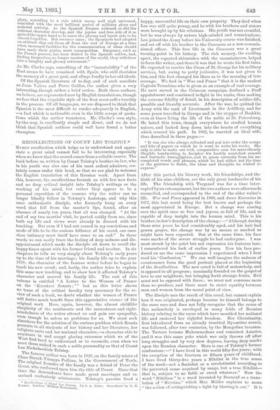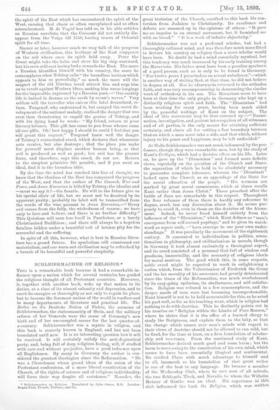RECOLLECTIONS OF COUNT LEO TOLSTOY.*
Evuar recollection which helps us to understand and appre- ciate a great mind cannot fail to be interesting, especially when we know that the record comes from a reliable source. The book before us, written by Count Tolstoy's brother-in-law, who in his youth was also one of his most ardent admirers, cer- tainly comes under this head, so that we are glad to welcome the English translation of this Russian work. Apart from this, however, the recollections furnish us with few new facts and no deep critical insight into Tolstoy's writings or the working of his mind, but rather they appear to be a personal exposition of the reasons why the writer can no longer blindly follow in Tolstoy's footsteps, and why this once enthusiastic disciple, who formerly hung on every word that fell from the master's lips, found, after an absence of nearly ten years, that all was changed. "At the end of my two months' visit, he parted coldly from me, since both my life and views were already in discord with his teaching. But even if I had not ceased in my convictions and mode of life to be the zealous follower of his creed, our once close intimacy must itself have come to an end." In these words we can easily trace the feeling of deep sadness and dis- appointment which made the disciple sit down to recall the happy times spent with his former friend and teacher. In six chapters he tells us very simply about Tolstoy's early years up to the time of his marriage; his family life up to the year 1878; the character of the famous writer before he began to teach his new creed; and, lastly, the author tries to explain this same new teaching, and to show how it affected Tolstoy's character and marred his family life. The rest of this volume is entitled "A Letter to the Women of France on the Kreutzer Sonata ; ' " but as this letter shows no trace of the critical faculty very necessary for the re- view of such a book, we doubt whether the women of France will derive much benefit from this appreciative resume of the original work. Here, again, however, the almost childlike simplicity of the sentiments and the earnestness and right- mindedness of the writer attract us and gain our sympathy, even though he solves no problems for us. We must seek elsewhere for the solutionf the e curious problem which Russia presents to all students of her history and her literature, her religious sects and her national character,—a character able to acquiesce in and accept glaring extremes which we of the West find hard
meet them to understand or to reconcile, even when we united in such a noble personality as that of Count Leo Nichola evitch Tolstoy.
The famous
Clear Streak. author was born in 1828, on the family estate of The original Ytisnaya Polillna, in the Government of Toula. founder of the family was a friend of Peter the
Great, who conferred upon him the title of Count. Since that
time the
a rartinod exclusively have made great marriages and re- y aristocratic. Tolstoy's parents lived a 711rner. London: Winiam-irehlot".. * Necollectiott
/3y O.. Behrs. Translated by C. B.
happy, uneventful life on their own property. They died when Leo was still quite young, and he with his brothers and sisters were brought up by his relations. His youth was not eventful,
but he was always by nature high-minded and conscientioue. Leo joined the Army before his University course was finished, and set off with his brother to the Caucasus as a non-commis-
sioned officer. This free life in the Caucasus was a great turning-point in his history. The rich scenery, the exciting sport, the repeated skirmishes with the mountaineers, helped to form the writer, and there it was that he wrote his first tales.
He expected to receive the Cross of St. George for his military services, but, owing to petty jealousies, it was not given to and this fact changed his ideas as to the meaning of true courage. We find in " War and Peace" that it is the modest Captain Touschine who is given as an example of real courage. He next served in the Crimean campaign, declined a Staff appointment and continued to fight in the ranks, thus making the extreme fidelity of detail, in his description of soldier-life, possible and literally accurate. After the war, he quitted the Army with the rank of Lieutenant in the Artillery, and for some years travelled in Europe and in the steppes of Bashkir, even at times living the life of the noble at St. Petersburg. He hated this town, though everywhere he studied human nature, and looked deep down into the hearts of everything which crossed his path. In 1862, he married an ideal wife, thus described in these pages :—
" It was she who always collected and put into order the scraps and bits of papers on which he is wont to write his works. Sho only is able to make out with comparative ease his marvellously illegible handwriting, to decipher his hastily scratched scrawls and fantastic hieroglyphics, and to guess correctly from his un- completed words and phrases, which he had either not the time or the patience to finish, the ideas and thoughts he wished to express.
After this period, his literary work, his friendships, and the• birth of his nine children, are the only great landmarks of his life. The friendship with Turgenef was for a time inter- rupted byan estrangement, but the two authors were afterwards reconciled, and corresponded to the end of the elder writer's life. War and Peace appeared in 1869, and Anna ICarenina in 1877, this last novel being the best known and perhaps the
most appreciated in Europe. But a change was coming over the spirit once so free and joyous, so full of life, and so.
capable of deep insight into the human mind. This is his brother-in-law's description of the change :—" Although during these nine years he had considerably aged, and his hair had grown greyer, the change was by no means so marked as• might have been expected. But at the same time, his face wore marks of the severe struggle he had undergone. I was
most struck by the quiet but sad expression his features bore. I remembered his look of earlier years. Now his face pro- duced on me the same impression I experienced when I first read his Confession.' " We can well imagine the sadness of
countenance from the good portrait placed at the beginning of the Recollections. The new creed is full of melancholy, and is opposed to all progress ; nominally founded on the gospel of love to our neighbour, but bringing forth strange fruits. Evil must not be opposed with force ; we must not consume more than we produce, and there must be strict equality between man and woman from the moral point of view.
The disciple sees the result of this creed, but cannot explain how it was originated, perhaps because he himself belongs to the same race and does not fully recognise that the cause of this melancholy is enveloped in many folds of Russian history relating to the races which have moulded her national life and enslaved her rightful freedom. Her Christianity, first introduced from an already troubled Byzantine source, was followed, after two centuries, by the Mongolian invasion.
The Tartars became Mahommedans and remained Asiatics, and it was this same yoke which was only thrown off after long struggles and by very slow degrees, leaving deep marks upon the Russian character. Here is one of Tolstoy's former
confessions :—" I have lived in this world fifty-five years; with the exception of the fourteen or fifteen years of childhood, I have lived thirty-five years a Nihilist in the true sense of the word—not a Socialist or a revolutionist according to the perverted sense acquired by usage, but a true Nihilist—
that is, subject to no faith or creed whatever." Now the word " Nihilism " is a word invented by Burnouf as a trans- lation of " NirvIlna," which Max Miller explains to mean " the action of extinguishing a light by blowing it out." It is the spirit of the East which has encountered the spirit of the West, causing that chaos so often unexplained and so often misunderstood. M. de Vogiid has told us, in his able articles on Russian novelists, that the Crescent did not entirely dis- appear from the Volga till 1550, leaving traces of Oriental spirit for all time.
Sooner or later, however much we may talk of the progress of Western civilisation, this heritage of the East reappears on the soil where once its spirit held sway. Peter the Great might take the helm and steer his big ship westward, but his crew still cast loving looks towards the East. The more a Russian identifies himself with his country, the more he contemplates what Tolstoy calls " the boundless horizon which appeals to him so powerfully," so much the more will the magnet of the old Nirvana creed attract him and urge him on to revolt against Western ideas, making him nurse longings for the impossible, expressed by a Russian poet,—" Our earthly life is bathed in dreams as the earth by ocean's waves." Very seldom will the traveller who enters this fatal dreamland, re- turn. Turgenef, who understood it, but escaped the worst de- velopment of the national malady, realised the danger that was even then threatening to engulf the genius of Tolstoy, and with his dying hand he wrote : " My friend, return to your literary labours. This gift has come to you from whence come all our gifts. Oh ! bow happy I should be could I feel that you will grant this request." Turgenef knew well the danger of Tolstoy's resuscitated creed, which declares that whosoever acts creates, but also destroys ; that the place you make for yourself must displace another human being, so that evil is produced as well as good ; but evil has the greater force, and therefore, says this creed, do not act. Return to the simplest primitive life possible, and if you want an ideal, find it in the harmless idiot.
By the time the mind has reached this line of thought, we know that the idealism of the East has conquered the progress of the West, and that the author of The Cossack, War and Peace, and Anna Karenina is killed by Tolstoy, the idealist and —must we say it P—the fanatic. He will in the future give us his special elixir of life, but we must not be deceived by its apparent purity; probably its label will be transcribed from the words of the wise peasant in Anna Karenina,—" Every evil comes from the folly, the wickedness of reason ; we have only to love and believe, and there is no further difficulty." This Quietism will soon lose itself in Pantheism, or a barely Christianised Buddhism ; and there will always be a hopeless fatalism hidden under a beautiful veil of intense pity for the sorrowful and the suffering.
In spite of all this, however, what is best in Russian litera- ture has a grand future. Its symbolism will counteract our materialism, and our worn-out civilisation may he refreshed by .a breath of its beautiful and powerful simplicity.



































 Previous page
Previous page